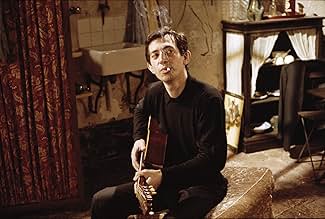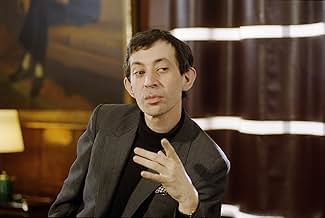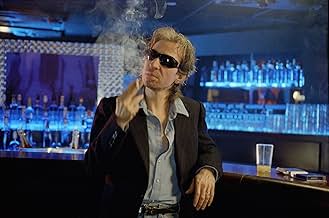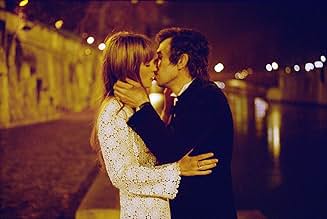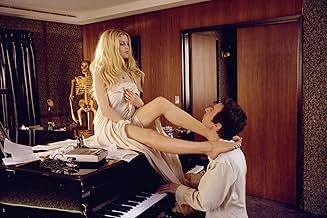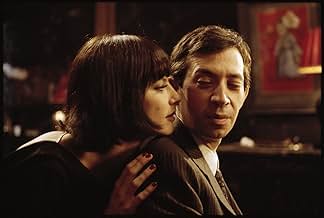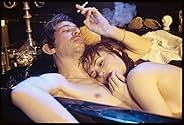IMDb रेटिंग
6.9/10
10 हज़ार
आपकी रेटिंग
अपनी भाषा में प्लॉट जोड़ेंA glimpse at the life of French singer Serge Gainsbourg, from growing up in 1940s Nazi-occupied Paris through his successful song-writing years in the 1960s to his death in 1991 at the age o... सभी पढ़ेंA glimpse at the life of French singer Serge Gainsbourg, from growing up in 1940s Nazi-occupied Paris through his successful song-writing years in the 1960s to his death in 1991 at the age of 62.A glimpse at the life of French singer Serge Gainsbourg, from growing up in 1940s Nazi-occupied Paris through his successful song-writing years in the 1960s to his death in 1991 at the age of 62.
- पुरस्कार
- 7 जीत और कुल 11 नामांकन
Dinara Drukarova
- Olga Ginsburg (la mère)
- (as Dinara Droukarova)
फ़ीचर्ड समीक्षाएं
Serge Gainsbourg was many things: an artist, writer, painter, alcoholic and lover to many. He is a fascinating man who lead a fascinating life and director Joann Sfar makes a great effort here to portray it all. From the early days prior to WWII Gainsbourg was clearly going to amount to something. As he grew older and dabbled here and there in various art forms and dabbled in various women with lovers including Bridgette Bardot and Jane Birkin. Yet as he grew older Gainsbourg dabbled in more drink and drugs and this led to a troubled life.
I was to begin with fascinated by this man, full of charm and wit and ideas abounding. Yet as the film progressed I felt less and less concerned by this man and began wondering when the film might end. As interesting he was, he was also not the nicest of characters, especially in his latter years when he appears to be a drunk and grumpy man. The little touches of fantasy work well to begin with, Gainsbourg's 'imaginary friend' is interesting, but then becomes more and more grotesque and yet more annoying and often blurs the line between realism and surrealism.
Ultimately this has enough to provide an interesting account of someone who had a very full life, but for me it lost it's way part way through and therefore lost it's momentum.
More of my reviews at iheartfilms.weebly.com
I was to begin with fascinated by this man, full of charm and wit and ideas abounding. Yet as the film progressed I felt less and less concerned by this man and began wondering when the film might end. As interesting he was, he was also not the nicest of characters, especially in his latter years when he appears to be a drunk and grumpy man. The little touches of fantasy work well to begin with, Gainsbourg's 'imaginary friend' is interesting, but then becomes more and more grotesque and yet more annoying and often blurs the line between realism and surrealism.
Ultimately this has enough to provide an interesting account of someone who had a very full life, but for me it lost it's way part way through and therefore lost it's momentum.
More of my reviews at iheartfilms.weebly.com
As an Englishman I didn't have as much of an idea of Serge Gs career as most of the previous critics here, so a lot of this film was pretty educational. However, it wasn't a literal biopic by any means, using the cartoon characters alongside Serge (quite well, I thought) and the latter half of his life (I didn't realise when or whether he'd died until I'd read one of your reviewers!) seemed to tail off into nothing, even more than his increasing physical degradation was suggesting.
I found the emphasis on his sexual groundbreaking and role as a general iconoclast a bit similar to the film "Mesrine" which came out a year or two back - a similar time period was covered in that - masses of smoke and sexism! The actresses playing Jane Birkin and Juliette Greco are good (especially Jane Bs English/French accent) but "Brigitte Bardot" less so, and the scenes with her do go on a bit (although some of the poses are meant to correspond with real Bardot roles like "Et Dieu Crea La Femme" and "La Mepris".
The music fits in well with the film and, surprisingly - with the film making style - the intrusion of early 1960s loud pop, and of reggae, is quite a shock to the system, as it is intended to be, and was at the time. Perhaps I'm missing some of the French references, but in general the milieu Gainsbourg moved in might not be best served by a "straight" biopic with a Nicholas Cage-type performance, but the surrealist cartoons do detract from the picture we get of Serge - and believe me, it's not that easy to like him! I wasn't that keen on the precocious young boy stage of his life either - a bit too "that's the French way boys grow up" all very pre-Simone de Beauvoir.
Anyway shouldn't carp too long - I was glad I saw it and a lot will stay with me, although I'll remember the Django-type guitar playing possibly longer than the (apparently rather few) Gainsbourg songs which graced the soundtrack.
I found the emphasis on his sexual groundbreaking and role as a general iconoclast a bit similar to the film "Mesrine" which came out a year or two back - a similar time period was covered in that - masses of smoke and sexism! The actresses playing Jane Birkin and Juliette Greco are good (especially Jane Bs English/French accent) but "Brigitte Bardot" less so, and the scenes with her do go on a bit (although some of the poses are meant to correspond with real Bardot roles like "Et Dieu Crea La Femme" and "La Mepris".
The music fits in well with the film and, surprisingly - with the film making style - the intrusion of early 1960s loud pop, and of reggae, is quite a shock to the system, as it is intended to be, and was at the time. Perhaps I'm missing some of the French references, but in general the milieu Gainsbourg moved in might not be best served by a "straight" biopic with a Nicholas Cage-type performance, but the surrealist cartoons do detract from the picture we get of Serge - and believe me, it's not that easy to like him! I wasn't that keen on the precocious young boy stage of his life either - a bit too "that's the French way boys grow up" all very pre-Simone de Beauvoir.
Anyway shouldn't carp too long - I was glad I saw it and a lot will stay with me, although I'll remember the Django-type guitar playing possibly longer than the (apparently rather few) Gainsbourg songs which graced the soundtrack.
Where does this amazing film come from? Who is Joann Sfar, a director I never heard about before? The easiest answer at hand was the wikipedia entry which tells us that Sfar is a well known comics author in the fabulous French-Belgian tradition. He is of Jewish origin, and his next film is an adaptation of one of his comics successes called The Rabbi's Cat.
And suddenly all makes sense. The opening scenes of the film contain the key of the biography of French musician and poet Serge Gainsbourg as imagined by Sfar. We see Lucien Ginzburg, a Jewish kid in occupied Paris during WWII daring not only to laugh in fronde at the nose of the collaborationist police by being the first in line to receive his yellow Star of David as a sign of nobility rather than an anathema, but moreover, to transform in his mind and his sketch drawings the fat rapacious Jew on the Vichy posters in the thin, stylish, long nose and big years Gueule - the alter-ego who will guide his steps and feed his revenging self-confidence for the rest of his life.
The combination of acting and cartoon is not a new thing, but it has never been tried before in a biopic to the best of my knowledge. Sure, it is not the usual respectful biopic but it's the vision of Sfar about Ginzburg - Gainsbourg, and Sfar he says in the final text before the credits was more interested about Gainsbourg lies than by his perceived truths. Moreover, for sure Gainsbourg himself would not have appreciated a respectful film. Ironically under-titled 'Vie heroique' (heroic life) the film takes us though the artistic and especially womanizing career of Gainsbourg from the early 50s to the late 70s. We see him in the company of such French cultural icon as Boris Vian and especially of fabulous women such as Juliette Greco, Brigitte Bardot and Jane Birkin (and actually the list in the film is very partial). I enjoyed each of the scenes in this part of the film which combine style, attention to details (just follow how fashion changes marking the progress of time) and deep understanding of the atmosphere of the Parisian clubs and artistic milieu in the mythic mid-20 century. His Gueule alter-ego mentors him though this trip and when he decides to renounce his patronizing, it's the beginning of the end - the charisma goes away and the effects of his excesses slowly destroy him. Maybe a little more of his art would have provided an even more complex and balanced image of the person that Gainsbourg was - this would be my only observation.
The choice of Eric Elmosnino as Gainsbourg is excellent, he drives the character from the insecurity of the young age to the decay of the end, all the time with charm and deep empathy. He proves a perfect understanding of the intentions of the director and a full identification with the identity dilemmas of the French-Jewish Gainsbourg. Laetitia Casta is a perfect replica of Bardot. Lucy Gordon is mastering very well Jane Birkin's role. Her maturity makes even harder to explain the suicide of the young actress a few days before the film was presented in avant-premiere at Cannes.
And suddenly all makes sense. The opening scenes of the film contain the key of the biography of French musician and poet Serge Gainsbourg as imagined by Sfar. We see Lucien Ginzburg, a Jewish kid in occupied Paris during WWII daring not only to laugh in fronde at the nose of the collaborationist police by being the first in line to receive his yellow Star of David as a sign of nobility rather than an anathema, but moreover, to transform in his mind and his sketch drawings the fat rapacious Jew on the Vichy posters in the thin, stylish, long nose and big years Gueule - the alter-ego who will guide his steps and feed his revenging self-confidence for the rest of his life.
The combination of acting and cartoon is not a new thing, but it has never been tried before in a biopic to the best of my knowledge. Sure, it is not the usual respectful biopic but it's the vision of Sfar about Ginzburg - Gainsbourg, and Sfar he says in the final text before the credits was more interested about Gainsbourg lies than by his perceived truths. Moreover, for sure Gainsbourg himself would not have appreciated a respectful film. Ironically under-titled 'Vie heroique' (heroic life) the film takes us though the artistic and especially womanizing career of Gainsbourg from the early 50s to the late 70s. We see him in the company of such French cultural icon as Boris Vian and especially of fabulous women such as Juliette Greco, Brigitte Bardot and Jane Birkin (and actually the list in the film is very partial). I enjoyed each of the scenes in this part of the film which combine style, attention to details (just follow how fashion changes marking the progress of time) and deep understanding of the atmosphere of the Parisian clubs and artistic milieu in the mythic mid-20 century. His Gueule alter-ego mentors him though this trip and when he decides to renounce his patronizing, it's the beginning of the end - the charisma goes away and the effects of his excesses slowly destroy him. Maybe a little more of his art would have provided an even more complex and balanced image of the person that Gainsbourg was - this would be my only observation.
The choice of Eric Elmosnino as Gainsbourg is excellent, he drives the character from the insecurity of the young age to the decay of the end, all the time with charm and deep empathy. He proves a perfect understanding of the intentions of the director and a full identification with the identity dilemmas of the French-Jewish Gainsbourg. Laetitia Casta is a perfect replica of Bardot. Lucy Gordon is mastering very well Jane Birkin's role. Her maturity makes even harder to explain the suicide of the young actress a few days before the film was presented in avant-premiere at Cannes.
The life story of Serge Gainsbourg had to be filmed, and as he's one of the famous Frenchmen who aren't in fact Belgian, it's only a surprise that it took so long. That his life spanned the Nazi occupation to the rise of Disco would stretch credibility if this were fiction, but as it's all more or less true the director, who is already an accomplished graphic artist, manages to lift it to the level of slightly absurd fiction. Mixing in animation, self-consciously stagey sets and a life-sized puppet as Gainsbourg's dreaded alter ego.
Even the sordid lowlife is given the big treatment, and the early days in the garret look unashamedly glamorous as they would if re-imagined for an opera set or a Salvador Dali dream sequence, as director Joann Sfar lays it on with a trowel.
The episodic nature of the story gives it a rather patchy feel though, and I couldn't help thinking that one or two episodes, especially the cute Hollywood-style musical scene with Brigitte Bardot, could have been shorter. Bardot was just one of the high-profile women Gainsbourg captured, and so was the muse of the existentialists, Juliette Greco.The casting is pretty uncanny with the possible exception of Greco, who was never that model-thin.
Gainsbourg has always been, at least outside France, more famous for being cool than for his music. But his reworking of La Marseillaise which so upset the rightwing patriots of the Seventies was nothing but excellent. I'll go back just to hear that Sly and Robbie riddim one more time.
Quite a substantial feast but it's worth building up an appetite in advance. And of course, you get Jane Birkin and... That Song.
Even the sordid lowlife is given the big treatment, and the early days in the garret look unashamedly glamorous as they would if re-imagined for an opera set or a Salvador Dali dream sequence, as director Joann Sfar lays it on with a trowel.
The episodic nature of the story gives it a rather patchy feel though, and I couldn't help thinking that one or two episodes, especially the cute Hollywood-style musical scene with Brigitte Bardot, could have been shorter. Bardot was just one of the high-profile women Gainsbourg captured, and so was the muse of the existentialists, Juliette Greco.The casting is pretty uncanny with the possible exception of Greco, who was never that model-thin.
Gainsbourg has always been, at least outside France, more famous for being cool than for his music. But his reworking of La Marseillaise which so upset the rightwing patriots of the Seventies was nothing but excellent. I'll go back just to hear that Sly and Robbie riddim one more time.
Quite a substantial feast but it's worth building up an appetite in advance. And of course, you get Jane Birkin and... That Song.
There was probably a good few hundred reasons to fail that movie about the life of the most famous french song writer but I was happy to find out the director didn't fall in any of these traps. This movie was poetic, touching, elegant and engaging. Retracing Lucien Ginsburg's life with style and a touch of romanticism, the two hours unfolded so quickly that I was almost surprised when the credits started to roll. From his childhood in Nazi occupied Paris to his encounters with Boris Vian or Les Freres Jacques, from his rise to success with Bardot or Jane Birkin, the story marks all the important moments in the life of this unforgettable composer that has left many generations dazzled by his craftsmanship.
Eric Elmosnino is simply gigantic in this role, conjuring all the greatness of Serge Gainsbourg, letting us get a glimpse of its never seen before talent as well as his fragility. The staging of an alter ego representing his genie, pushing and pulling him to become the man we know is right on the spot to express his inner conflict to choose between painting and music. Music is a minor art, the man used to say as he recorded albums upon albums that are still to this day amongst the most compelling creations in french song writing. Many bits of lyrics used throughout the movie are poking the aficionado in the best way possible.
Avoiding the traps of linear storytelling as it has to respect chronological events, it goes back and forth through time using the protagonist at different periods of his life to put in perspective what goes on in his mind. From young Lucien to l'Homme à Tête de Chou, from the fusion of Serge with his genie to become Gainsbarre, I spent an exquisite moment in the life of a man whose music and lyrical excellence have touched me as a teenager and still remain a defining influence in my life. No need to say the music is beautifully embedded in this graceful biography.
The only minor inconvenience I could point out is Laetitia Casta that plays Brigitte Bardot without an ounce of talent, but fortunately these scenes are short and quickly forgotten. I recommend this film to anyone that has remotely enjoyed Gainsbourg's artwork at any point in his life for it is an amazing and poetic experience you will not regret. It is brilliantly shot and edited with both rhythm and attention to quiet emotional scenes. It takes you up and down with the protagonist's questioning about the meaning of his life and his descent to hell from which he never came back. Thank you Johan Sfar.
Ugliness is in a way superior to beauty because it lasts.
Serge Gainsbourg
(www.radiostationexp.blogspot.com)
Eric Elmosnino is simply gigantic in this role, conjuring all the greatness of Serge Gainsbourg, letting us get a glimpse of its never seen before talent as well as his fragility. The staging of an alter ego representing his genie, pushing and pulling him to become the man we know is right on the spot to express his inner conflict to choose between painting and music. Music is a minor art, the man used to say as he recorded albums upon albums that are still to this day amongst the most compelling creations in french song writing. Many bits of lyrics used throughout the movie are poking the aficionado in the best way possible.
Avoiding the traps of linear storytelling as it has to respect chronological events, it goes back and forth through time using the protagonist at different periods of his life to put in perspective what goes on in his mind. From young Lucien to l'Homme à Tête de Chou, from the fusion of Serge with his genie to become Gainsbarre, I spent an exquisite moment in the life of a man whose music and lyrical excellence have touched me as a teenager and still remain a defining influence in my life. No need to say the music is beautifully embedded in this graceful biography.
The only minor inconvenience I could point out is Laetitia Casta that plays Brigitte Bardot without an ounce of talent, but fortunately these scenes are short and quickly forgotten. I recommend this film to anyone that has remotely enjoyed Gainsbourg's artwork at any point in his life for it is an amazing and poetic experience you will not regret. It is brilliantly shot and edited with both rhythm and attention to quiet emotional scenes. It takes you up and down with the protagonist's questioning about the meaning of his life and his descent to hell from which he never came back. Thank you Johan Sfar.
Ugliness is in a way superior to beauty because it lasts.
Serge Gainsbourg
(www.radiostationexp.blogspot.com)
क्या आपको पता है
- ट्रिवियाThe project was originally envisioned with Serge Gainsbourg's real life daughter, actress Charlotte Gainsbourg to play him in keeping with the film's surreal and fairytale-esque tone. Six months into rehearsals and preparation Gainsbourg pulled out telling director Joann Sfar, it was proving too emotionally painful and he would have to make his "beautiful film" without her. Sfar had always approached the film with her in mind and was ready to abort the project when fate lead him to Eric Elmosnino.
- गूफ़The young Gainsbourg is shown drawing left-handed, but the adult Gainsbourg becomes right-handed.
- भाव
Serge Gainsbourg: [after a man tips him while he plays the piano] What are you fucking kidding me? I'm not a jukebox!
- क्रेज़ी क्रेडिट"Pour Lucy" i.e. this was Lucy Gordon 's last film.
- इसके अलावा अन्य वर्जनEngland is the first territory to release a new cut of the film, running 14 minutes shorter than the previous version and is Joann Sfar's preferred one. Changes include -
- Deletion of the scene where young Serge pleads in vain for his mother to buy him a gun to play with, even attempting to bribe her by saying he'll work harder on the piano. This precedes the scene where he steals the gun from the shop.
- Deletion of the scene where Serge and Boris Vian walk to his apartment and the two lie in the road in an effort to stop a cab. While they wait Serge reveals he has a double that follows him around to which Vian replies his is a werewolf. However two policemen soon cut the conversation short. (This precedes Serge arriving at Boris's apartment and explains a later scene where a drunken Serge lies in the road before having the police escort to his concert)
- Longer scene of the "Baby Pop" groupies, as Gainsbourg wakes up in bed with two naked women as his Mug joyously tosses bank statements at him revealing how rich he is from "Poupée de cire, poupée de son" alone! This is the original lead in to "Qui Est In Qui Est Out".
- The groupies and party to "Qui Est In Qui Est Out" is cut short, removing Serge narrating about "the mouth being the primary sexual organ". His narration reveals the girls in the room he has slept with and how he was with them. It reveals Gainsbourg's occasional cruel streak and precedes the angry neighbor banging on the door.
- After Gainsbourg recites La Marseillaise at the press conference, we then see young Serge repeating it and triumphantly raising his fist to the audience.
- Deletion of a short exchange in the nightclub when a reveller comments to Gainsbourg about him being parodied on a French TV show. The new version removes these lines either because the show is unknown outside of France or because it doesn't tie in as being the night Gainsbourg met his wife Bambou as that TV show wouldn't air until years later. Sfar has said this new version will be the one further released worldwide.
- कनेक्शनFeatured in De wereld draait door: एपिसोड #5.128 (2010)
टॉप पसंद
रेटिंग देने के लिए साइन-इन करें और वैयक्तिकृत सुझावों के लिए वॉचलिस्ट करें
विवरण
- रिलीज़ की तारीख़
- कंट्री ऑफ़ ओरिजिन
- आधिकारिक साइटें
- भाषाएं
- इस रूप में भी जाना जाता है
- Gainsbourg: A Heroic Life
- फ़िल्माने की जगहें
- Rue de Verneuil, Paris 6, पेरिस, फ़्रांस(Gainsbourg's house)
- उत्पादन कंपनियां
- IMDbPro पर और कंपनी क्रेडिट देखें
बॉक्स ऑफ़िस
- बजट
- €1,15,00,000(अनुमानित)
- US और कनाडा में सकल
- $2,33,007
- US और कनाडा में पहले सप्ताह में कुल कमाई
- $25,189
- 4 सित॰ 2011
- दुनिया भर में सकल
- $1,22,20,456
- चलने की अवधि2 घंटे 15 मिनट
- रंग
- ध्वनि मिश्रण
- पक्ष अनुपात
- 2.35 : 1
इस पेज में योगदान दें
किसी बदलाव का सुझाव दें या अनुपलब्ध कॉन्टेंट जोड़ें

टॉप गैप
By what name was Gainsbourg (Vie héroïque) (2010) officially released in Canada in English?
जवाब



